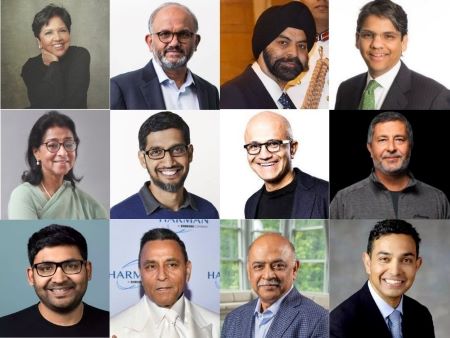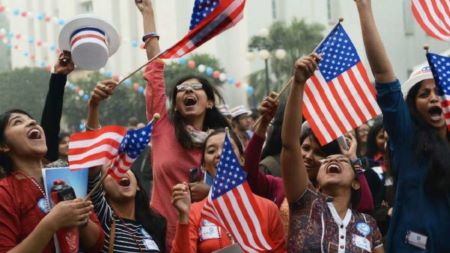Many Indians living in India wanted Kamala Harris to win the U.S. Presidential election, as if her victory would greatly benefit India. Similarly, many NRIs in America largely voted for her because she was half Indian by heritage.

Kamala Harris
This was misguided, as even if she had been elected President, her focus would have been on American interests, not India’s. It reflects a larger tendency among Indians to attach undue importance to the achievements of people of Indian origin abroad, often failing to grasp the complex realities of global politics and national loyalties.
It is as irrational as Indians celebrating Rishi Sunak becoming the Prime Minister of the UK, as though his leadership would somehow benefit India. Indians often take pride in people of Indian origin becoming CEOs of major U.S. corporations.
Whenever a person of Indian origin assumes the role of CEO at a global corporation based in the U.S., many Indians act as if India now has a stake in America, assuming that the individual will prioritize Indian interests. This kind of thinking is a symptom of what some analysts call “diaspora delusion”—the mistaken belief that individual success abroad translates into benefits for India.
The reality is that from Pepsi to Google, Microsoft to Twitter, CEOs of Indian origin are committed solely to the profits of their respective corporations. They may be of Indian origin, but they are not Indian in mindset, nor do they exhibit any particular empathy for India.
These business leaders operate in a fiercely competitive corporate environment, where loyalty to their company’s shareholders takes precedence over any emotional ties to their country of origin. It is essential to understand that corporate structures in the West are not governed by individual sentiments; they are driven by profit and strategic interests.

CEOs of Indian origin leading organisations
None of them hold Indian citizenship—they relinquished it long ago, and they are largely indifferent to India’s concerns. While there is nothing inherently wrong with pursuing a better life abroad, it is unrealistic to expect that these individuals will act in India’s interest merely because of their heritage.
The global economy does not operate on sentiment but on hard economic calculations, and these leaders are judged on their ability to deliver results for their corporations, not for any country’s pride.
Currently, I am in California, and I recently met a 55-year-old gentleman of Indian origin who migrated to the U.S. around 30 years ago. When I attempted to discuss India with him, he made it clear that he wasn’t interested, as he had become an American citizen long ago. He no longer followed events in India, considering it, for all practical purposes, a foreign country.
This encounter underscores a crucial point: once someone adopts another country’s citizenship, their priorities and loyalties naturally shift.

Indians in USA
This seems to reflect the mindset of most NRIs in America and other Western countries. For many, the decision to migrate involves a conscious detachment from India, focusing instead on integrating into their new society.
They are often more concerned with the issues facing their adopted homeland—whether it’s politics, the economy, or local culture—than the complexities of Indian society. This is not a betrayal of their roots but a practical adaptation to their new circumstances.
Moreover, the glorification of Indian-origin success stories often masks deeper insecurities about India’s place in the global order. Many Indians long for international recognition, hoping that the success of individuals abroad will validate India’s potential and cultural impact.
However, such validation is superficial and does not address the underlying challenges within India—poverty, inequality, political strife, and social divisions. True progress for India cannot come from the accomplishments of a few individuals overseas; it must come from substantial development within the country itself.
 Indians living in India need to mature and recognize these realities. Instead of celebrating the achievements of the diaspora as if they were victories for India, it would be more productive to focus on domestic growth, innovation, and leadership.
Indians living in India need to mature and recognize these realities. Instead of celebrating the achievements of the diaspora as if they were victories for India, it would be more productive to focus on domestic growth, innovation, and leadership.
A stronger India will be built not through symbolic pride but through tangible improvements in education, infrastructure, healthcare, and governance. Embracing this reality is the first step towards creating a self-sufficient nation that no longer needs to look abroad for validation.
In conclusion, while it is natural to feel a sense of connection to those who share our heritage, it is important not to be swayed by emotional symbolism. Real progress requires facing hard truths about national interests, the limitations of individual influence abroad, and the necessity of building a strong foundation at home. ![]()
Also Read: The Modern Janus
Disclaimer : PunjabTodayNews.com and other platforms of the Punjab Today group strive to include views and opinions from across the entire spectrum, but by no means do we agree with everything we publish. Our efforts and editorial choices consistently underscore our authors’ right to the freedom of speech. However, it should be clear to all readers that individual authors are responsible for the information, ideas or opinions in their articles, and very often, these do not reflect the views of PunjabTodayNews.com or other platforms of the group. Punjab Today does not assume any responsibility or liability for the views of authors whose work appears here.
Punjab Today believes in serious, engaging, narrative journalism at a time when mainstream media houses seem to have given up on long-form writing and news television has blurred or altogether erased the lines between news and slapstick entertainment. We at Punjab Today believe that readers such as yourself appreciate cerebral journalism, and would like you to hold us against the best international industry standards. Brickbats are welcome even more than bouquets, though an occasional pat on the back is always encouraging. Good journalism can be a lifeline in these uncertain times worldwide. You can support us in myriad ways. To begin with, by spreading word about us and forwarding this reportage. Stay engaged.
— Team PT

